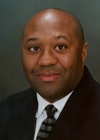 Dr. Edward Leach
Dr. Edward LeachAUSTIN, Texas — Around 1,200 community college faculty, staff and administrators nationwide and abroad gathered here this week for the 36th annual National Institute for Staff and Organizational Development (NISOD) conference. Such community college stakeholders engaged on many issues including educational technology, professional development and leadership.
NISOD presenters also focused on diversity and equity issues, highlighting strategies designed to make community college campuses more inclusive. Dr. Edward J. Leach, NISOD’s new director, is proud to be a part of an organization that showcases the latest advances in postsecondary education at community and technical colleges while helping to ensure all students — especially minorities and the underrepresented — have access to higher education.
“I’m very pleased with the feedback we have received from attendees. From presidents … down to faculty and staff, many were pleasantly surprised at the turnout and effectiveness of the sessions,” said Leach. “Next year we hope to have more sessions that are staff-focused since they are instrumental in the success of community colleges and the students they serve.”
One session, titled, “Culture and Poverty: Key Challenges Impacting Minority Male Success,” focused on the achievement of minority men in the midst of challenging socioeconomic circumstances. President Ervin Griffin Sr. and Grants and Research Director Daniel Lovett of Halifax Community College in Weldon, North Carolina underscored the value of looking beyond preconceptions that plague the 65,000 citizens of Northampton County where 30 percent, most of whom are African-American, live below the national poverty rate.
Halifax Community College’s P.R.I.D.E. (PReparing Men for Intellectual, AcaDemic and & Educational Success) mentoring program exposes students to professionals and mentors consisting of minority men of all ages that have achieved academic and professional success. “Our mentoring program focuses on our students making decisions not based on emotions, because emotional decisions are usually wrong decisions,” said Griffin.
Duane Reid, director of the Academic Acceleration for African American (4A) Males Program at Baltimore City Community College (BCCC), also presented on its continued success at NISOD and provided advice for attendees on how to fund similar programs at their institutions. Historically, it has taken 10 years for African-American males and eight years for African-American females to earn an associate degree at BCCC. As of the spring 2014 semester, seven out of 10 student participants in the 4A program have graduated from BCCC. “The ‘My Brother’s Keeper,’ among other initiatives, have proven to be an effective new source of funding that can help other colleges address the 20 percent graduation and transfer rate of minority community college students,” said Reid.
A special session focused on “STEM Workforce Development in Community Colleges Targeting African-American and Latino Students.” Iris Wagstaff, STEM education research scholar at North Carolina State University, discussed strategies on how to prepare the next generation of Black and Hispanic STEM students. “We need to leverage collaborations with minority professional scientific organizations where tutoring is available and students will have access to mentoring from professionals that look like them,” said Wagstaff.
University of Texas at Austin Project M.A.L.E.S. research coordinator and higher education doctoral candidate Sarah Rodriguez highlighted some startling diversity statistics when it comes to STEM disciplines. “Over a third of Latinas indicated a desire to pursue science or engineering while only 1 percent are employed scientists or engineers,” said Rodriguez. “Even if boutique policy programs may not be possible due to lack of funding for an African-American STEM program or Latino/Latinas STEM program, your institution might want to consider gender as a lens.”
Diverse Executive Editor David Pluviose was on hand to announce the NISOD Community College Excellence in Diversity Award. NISOD will annually recognize member institutions that show exceptional commitment to diversity in student and staff recruitment and retention practices along with inclusive work environments and meaningful community engagement opportunities. Please click here for more information.
Jamal E. Mazyck can be reached at [email protected] and on Twitter @jmbeyond7.















